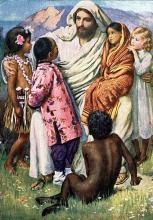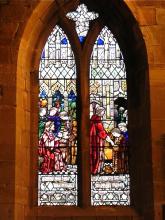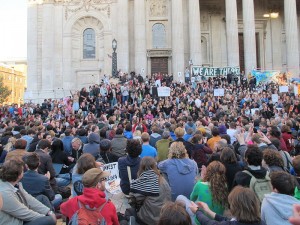Matthew 25

Many people in America are poor, due to no fault of their own—and their numbers are growing.
If you really know any poor people, you know that to be true. If you don’t, the first sentence of this post runs against the grain of many cultural assumptions in America that tend to blame people for being poor.
On the eve of the first Presidential debate, Sojourners premiered The Line — a film about the new faces of poverty in America. In this powerful documentary from award-winning filmmaker Linda Midgett, those popular judgmental assumptions against poor people clearly and convincingly are debunked.
The Line, which I am asking everyone who reads this column to watch, deftly dismantles many stereotypes about poverty and shows why a growing number of Americans find themselves falling into it. The film does so by telling the personal stories of people who have fallen beneath “the line.”
My 14-year-old son Luke, watched the story of John: a banker from a failed bank who once made a six-figure salary, but who now finds himself a substitute teacher making $12,000 a year while trying to raise his three kids. John painfully talked about what it feels like to have to go to a food bank because he has no other viable choice.
His story caused Luke to ask his mom after the film, “John said he got straight A’s in school, so could that happen to me?”
 Yes, it's odd, having a rock star here—but maybe it's odder for me than for you. You see, I avoided religious people most of my life. Maybe it had something to do with having a father who was Protestant and a mother who was Catholic in a country where the line between the two was, quite literally, a battle line. Where the line between church and state was… well, a little blurry, and hard to see.
Yes, it's odd, having a rock star here—but maybe it's odder for me than for you. You see, I avoided religious people most of my life. Maybe it had something to do with having a father who was Protestant and a mother who was Catholic in a country where the line between the two was, quite literally, a battle line. Where the line between church and state was… well, a little blurry, and hard to see.
I remember how my mother would bring us to chapel on Sundays… and my father used to wait outside. One of the things that I picked up from my father and my mother was the sense that religion often gets in the way of God.
For me, at least, it got in the way. Seeing what religious people, in the name of God, did to my native land… and in this country, seeing God's second-hand car salesmen on the cable TV channels, offering indulgences for cash… in fact, all over the world, seeing the self-righteousness roll down like a mighty stream from certain corners of the religious establishment…
I must confess, I changed the channel. I wanted my MTV.
Even though I was a believer.
Perhaps because I was a believer.
~ Bono of U2, in his 2006 National Prayer Breakfast keynote address
President Obama connected his faith with his policies toward the poor at the National Prayer Breakfast on Thursday (2/2/12), a subtle but sharp contrast to remarks made by presidential hopeful Mitt Romney the day before.
"Living by the principle that we are our brother's keeper. Caring for the poor and those in need," Obama said before an audience of about 3,000 at the Washington Hilton. These values, he said, "they're the ones that have defined my own faith journey."
Specifically, Obama said, they translate to policies that support research to fight disease and support foreign aid. His faith, he continued, inspires him "to give up some of the tax breaks that I enjoy."
Quit hitting the snooze button.
It’s time for the church to wake up!
According to a Laura Sessions Stepp at CNN.com, evangelical churches are finally acknowledging a trend that statisticians have been tracking for years: young evangelicals are leaving the church in droves.
In the new report, You Lost Me: Why Young Christians Are Leaving Church and Rethinking Faith, Barna Group President David Kinnaman notes a 43 percent drop in Christian church attendance between the teen and early adult years.
Perhaps most intriguing is that research indicates younger people are not only departing from their elders on “social issues,” such as same-sex marriage and abortion, but on wealth distribution and care for the environment, as well.
According to a report in The Christian Science Monitor, three out of four millennials say that wealthy corporations and financiers have too much power and that taxes should be raised on the very wealthy. Two out of three say financial institutions should be regulated more closely.
While the issue of jobs and higher wages remain as important to millennials as they do to older voters, the widening “black hole” of church attendance in the 18-29 age demographic indicates a larger trend — young people are thirsting for social justice, and simply not finding those principles in the pews.

Your neighbor is every man woman and child who touched the supply chain used to make your cell phone, used to make the clothes you wear, the computers you type on and the cars you drive.
Your neighbors are all of God’s children. The theological reality that people of faith try to live out is that our neighbor is not defined by geographical proximity. Our neighbor is the person in need.
Sometimes, caring for our neighbor means a change of plans. Sometimes, caring for our neighbor means we have to slow down a little bit. Sometimes, caring for our neighbor might even cost us money.
There are people who haven’t wanted to get involved in the mess by the side of the road. They walk by it and say that it’s somebody elses responsibility. My job, they say, is at the end of the road at Jericho. I’m just being faithful to my shareholders by maximizing profit. My job is just getting the products people want into the hands of those that want them. I can’t be worried about those who get left by the side of the road of my supply chain. If I stop to help clean up the mess along the way it might cost time and money.

On Nov. 30, at Gordon College in Wenham, Mass., Sojourners CEO Jim Wallis and Arthur Brooks of the American Enterprise Institute, debated the question, "Is Free Enterprise Moral?"
The event was sponsored by the Center for Christian Studies and the Jerusalem and Athens Forum at Gordon as part of the college's ongoing "Faith Seeking Understanding" lecture series.
Watch complete video of the debate inside...

Here’s the story I tell about how I met my husband, Matthew.
I had left the conservative, sectarian church of my childhood along with their teaching that being Christian mostly meant buying an insurance policy for the hereafter. We were told not to concern ourselves with this world. We need not bother ourselves with the poor, the hungry, the stranger unless of course in doing so we might sell them the eternal insurance policy thus adding a notch to our holiness belt. See, as our hymns suggested, we were the spiritual 1 percent we were all about gold streets and mansions in heaven so the deteriorating sub-standard housing around the corner was not our concern.
Almost 10 years after leaving that form of Christianity and after involving myself quite deeply into issues of social justice I met Matthew, a really cute Lutheran seminary student. On our first date we sat across the booth from each other at el taco de Mexico and talked about social issues and we saw eye to eye on everything. Then he said, “my heart for the poor is rooted in my Christian faith” at which point I looked at him and thought: What are you? Like a unicorn? Some mythical combination of creatures that doesn’t exist in reality? Soon I learned there was a whole world of Christians out there who actually take Matthew 25 seriously. Who believe that when we feed the hungry, cloth the naked, and care for the sick we do so to Jesus’ own self.
Bread for the World has many recommendations in the new report, but I’d like to highlight just one for now: “Farm policies should lean more towards the production of healthy foods.”
Why this one? Most farm subsidies go to (wait for it) the largest, wealthiest producers (shocking, right?). Billions of dollars are spent subsidizing corn, wheat, soybeans, cotton and rice. Small and medium-size producers (many of whom grow vegetables — the foods that are supposed to make up half our dinner plate) receive little, if any, support from the current U.S. farm policy.
Securing affordable, healthy foods for our country’s poorest will in turn help us address other issues such as malnutrition and obesity, immigration, health care, and employment.

In Mathew 25, he allows no excuses, personal or institutional.
“As you have done it to the least of these, you have done it to me,” Jesus says without qualification. Apply that text to this terrible exploitation at Penn State and it certainly speaks explicitly to the most vulnerable children who have been so horribly abused there.
As it was done to them, it was done to Christ himself, the very Son of God. This famous text is one of the few passages of judgment in the New Testament.
Judgment is now needed at Penn State and beyond about how we continue to allow wealth, power, institutional protections, and cultural complicity to aid, abet, and enable the evil abuse of our most vulnerable children.

The Sunday, Nov. 13 lectionary gospel is Jesus’ Parable of the Talents (Matthew 25:14-30).
Kari Jo Verhulst, in Sojourners, reflected on Jesus’ challenging teaching: “The point is not to perfect our particular gifts, or ourselves, but to quit hoarding ourselves from others, and instead step out in faith that we have been given all we need.”
The following new hymn affirms that Jesus’ parable calls us to faithfulness even when it involves risk and challenge today.
O God, we yearn for safety; We long to be secure.
Yet faithful, loving service Is what you value more.
You give us what is needed; You love, forgive and save.
Then, sending us to serve you, You call us to be brave.
You give to some ten talents—to others, two or three;
To some you give one blessing To manage faithfully. ...

On Sunday (10/30), the Anglican Bishop of London, the Rt. Rev. Dr. Richard Chartres, met with Occupy London protesters who have encamped for several weeks now on the ground of St. Paul's Cathedral in London, in an ongoing attempt to get the demonstrators to leave church grounds.
Chartres wants the Occupiers to vacate cathedral property and stopped short, in an interview with the BBC yesterday, of saying he would oppose their forcible removal. Other British clergy, however, are rallying behind the demonstrators, saying they would physically (and spiritually) surround protesters at St. Paul's with a circle of prayer or "circle of protection."
[Editors' note: Below is a hymn written by Carolyn Winfrey Gillette to inspire churches to further support and pray for famine relief in Somalia.]
O God, You Love the Needy
7.6.7.6 D LLANGLOFFAN ("Rejoice, Rejoice, Believers")O God, you love the needy and care for all the poor!
Today our hearts are heavy with news of drought and war.
When plantings yield no harvest, when hungry people die,
When families flee, defenseless -- Lord, hear your people's cry!
Yesterday, the leaders of more than 50 Christian denominations and organizations drew a line in the sand of the budget debate, and asked our political leaders to do the same.
Thanks to Sojourners supporters and our partners, there is a full page ad in Politico today asking Congress, "What Would Jesus
